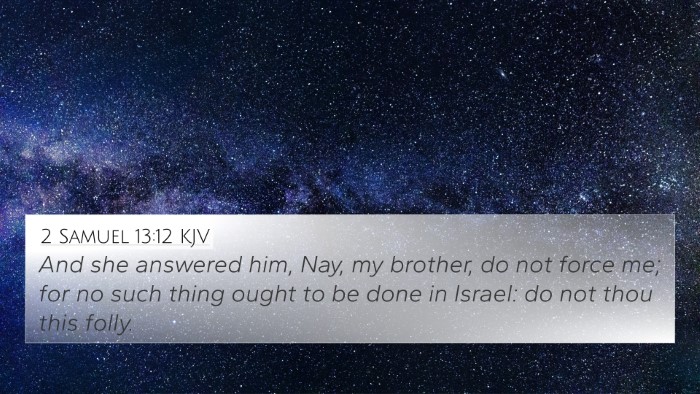Understanding Judges 20:6
Bible Verse: Judges 20:6: "And I took my concubine, and cut her in pieces, and sent her throughout all the country of the inheritance of Israel: for they had committed lewdness and folly in Israel."
Context and Overview
The verse occurs in a troubling account where the moral decay of Israel is highlighted. This passage is a response to a grievous crime committed in the city of Gibeah, where a righteous Levite's concubine was abused and killed. The Levite’s act of sending pieces of her body across Israel served as a call to action for the tribes to respond to this atrocity.
Commentary Insights
Matthew Henry's Commentary: Henry emphasizes that this shocking act was a desperate attempt to incite the people of Israel to rally against the immorality. The Levite's actions reflect both the severity of the crime and the dire state of justice in Israel at the time, with no king to uphold righteousness.
Albert Barnes' Notes: Barnes elaborates that the mutilation of the body symbolizes the deep national crisis within Israel. By using this disturbing method of communication, the Levite sought to stir the tribes from their apathy and unite them against evil. The passage underscores the dire consequences of sin and the need for community accountability.
Adam Clarke's Commentary: Clarke discusses the cultural and moral implications of the narrator's actions, suggesting that the dramatic appeal to the people indicates a profound loss of societal norms. He notes that this incident leads to a collective response against Gibeah, revealing the communal dynamics of justice and retribution in ancient Israel.
Thematic Connections
This verse illustrates various themes such as:
- Moral Decay: The spiritual and ethical decline seen in Israel during the time of the Judges.
- Collective Responsibility: The need for the community to stand against wrongdoing.
- Justice and Retribution: The biblical principle that evil deeds lead to divine or communal punishment.
- Human Depravity: The act of utter moral violation that leads to severe societal implications.
- Role of Leadership: The absence of strong, godly leaders during the period contributing to chaos.
Bible Verse Cross-References
This verse can be connected with several other passages that share thematic parallels or address similar issues:
- Judges 19:1-30: Background of the crime that leads to the events in Judges 20.
- 1 Samuel 11:7: An example of a similar rallying call to arms among the Israelites.
- 2 Samuel 20:1-2: Another instance of civil discord that reflects the absence of unity.
- Proverbs 1:10-15: The necessity to resist evil companions and stand for righteousness.
- Ezekiel 18:30: A call for repentance echoing the need for accountability within communities.
- Galatians 6:1-2: The importance of restoring one another with a spirit of gentleness, linking to community involvement.
- Matthew 18:15-17: The principles of confronting sin within the community resonates with the need for justice seen in Judges.
Connecting and Linking Bible Scriptures
Exploring Potential Links: Understanding this verse invites a broader exploration of the connections between Bible verses. For instance, the call to justice in Judges 20 can be examined alongside teachings from the New Testament about community accountability and loving one's neighbor.
Cross-Referencing Biblical Texts: Tools for Bible cross-referencing can facilitate the identification of these connections; utilizing a Bible concordance or cross-reference guide can enrich understanding. Parallels can be drawn from the extremes of human sinfulness in the Old Testament and the redemptive calls in Christ's teachings.
Conclusion
The complex narrative surrounding Judges 20:6 serves as a solemn reminder of the consequences of moral failure and the importance of righteous leadership and collective responsibility. By exploring its connections with other biblical texts, one can better understand the overarching themes of justice, restoration, and accountability that permeate Scripture.








